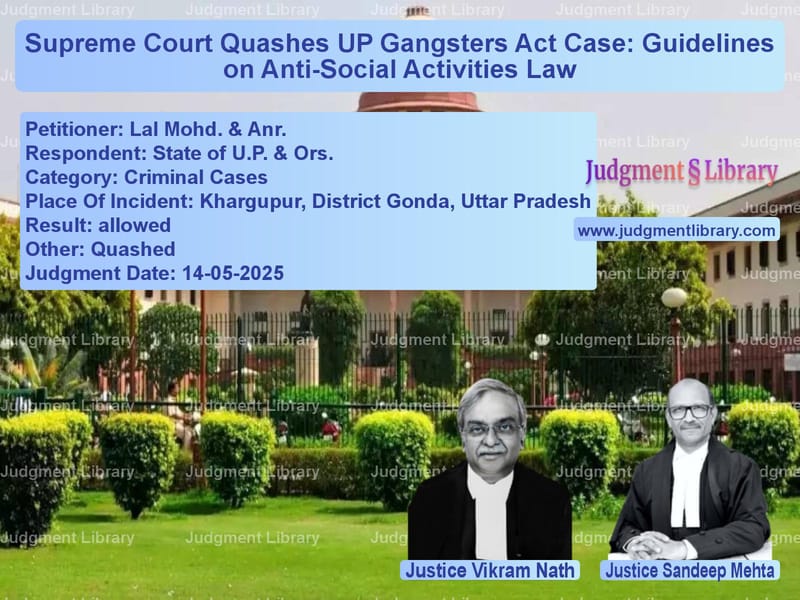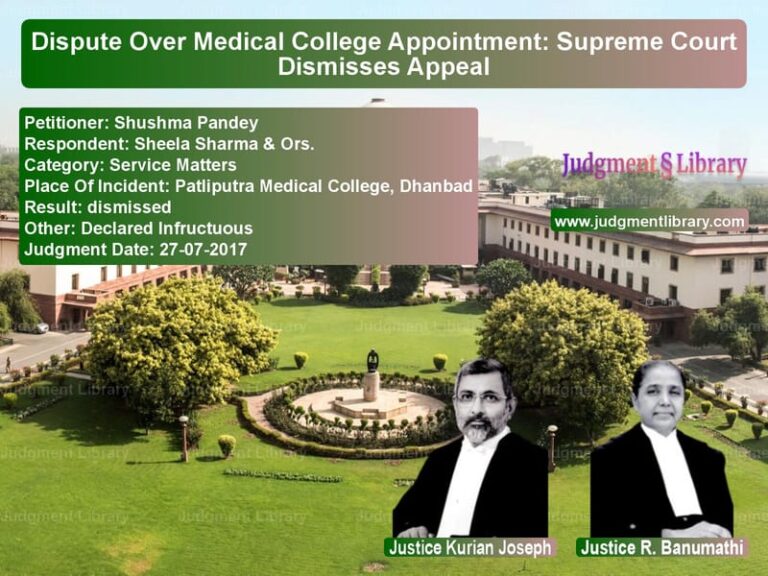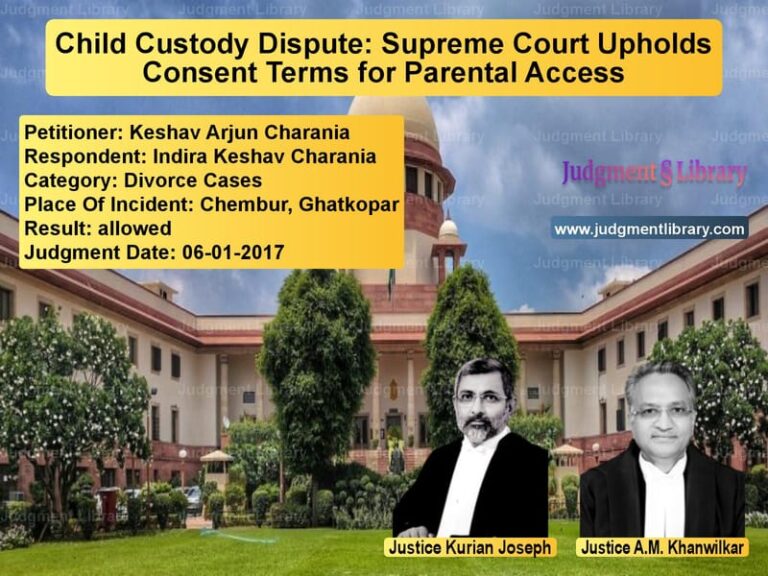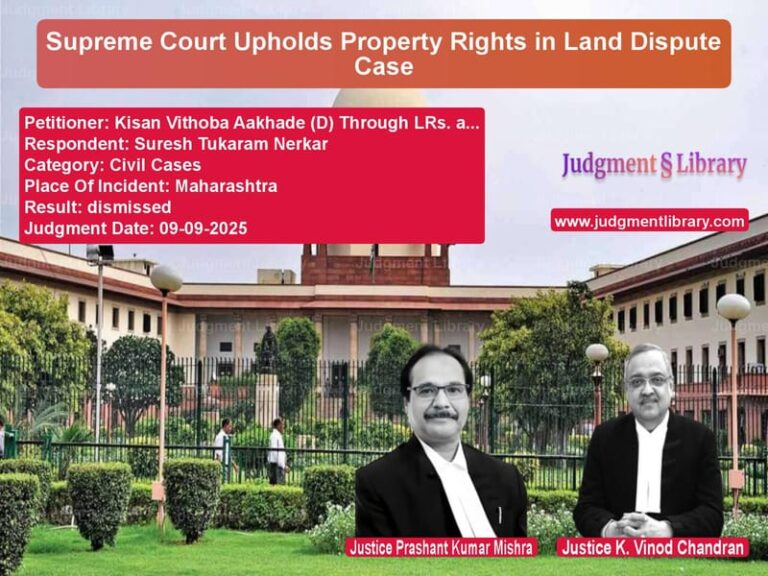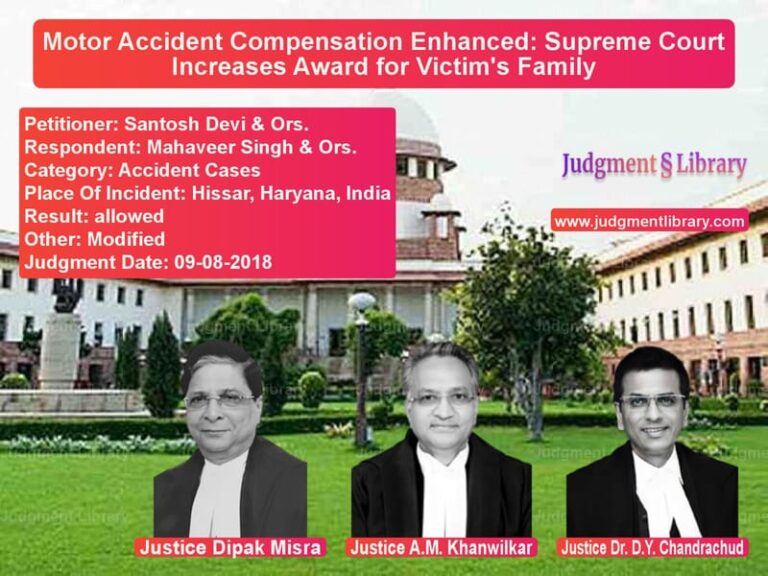Supreme Court Quashes UP Gangsters Act Case: Guidelines on Anti-Social Activities Law
In a significant ruling that clarifies the boundaries of special criminal legislation, the Supreme Court of India has quashed a First Information Report (FIR) registered under the Uttar Pradesh Gangsters and Anti-Social Activities (Prevention) Act, 1986 against two political figures from Gonda district. The judgment delivered by Justices Vikram Nath and Sandeep Mehta emphasizes that extraordinary laws with stringent provisions cannot be invoked for isolated incidents without evidence of sustained organized criminal activity.
The case involved Lal Mohd., a former two-time elected Chairman of Nagar Panchayat, and his son, who were accused of leading an organized gang that vandalized a shop in protest against a social media post perceived as defamatory towards a particular religion. The incident occurred on October 10, 2022, leading to multiple FIRs being registered initially under regular provisions of the Indian Penal Code.
What made this case particularly noteworthy was the subsequent registration of an FIR under the UP Gangsters Act nearly six months after the initial incident, raising serious questions about the timing and motivation behind invoking this stringent legislation.
The Background of the Case
The legal battle began when Rikki Modanwal made a social media post on October 10, 2022, which was perceived as defamatory towards a particular religion. In response, several believers of that religion, including the appellants, assembled outside Modanwal’s shop in Khargupur, Uttar Pradesh, raising vociferous protests. The situation escalated into violence and acts of vandalism between different religious groups.
Multiple FIRs were registered on October 11, 2022, against those involved in the incidents. The first FIR (CC No. 294 of 2022) was registered by Sonu Modanwal naming 41 accused persons, including the appellants, for offenses under Sections 147, 148, 149, 427, 307, 323, 504, and 506 of the Indian Penal Code and Section 7 of the Criminal Law Amendment Act, 2013. A second FIR (CC No. 296 of 2022) was registered by Sub-Inspector Bhole Shankar on the same date against members of both religious groups under similar provisions.
The appellants were arrested in connection with these cases and subsequently released on bail. However, nearly six months later, on April 30, 2023, Inspector Arun Kumar Dwivedi filed another FIR under Section 3(1) of the UP Gangsters Act against the appellants and 39 other accused persons. This FIR alleged that the appellants led an organized gang whose members, armed with lathis and glass bottles, attacked the shop owned by Vipin Modanwal, creating chaos, terror, and disrupting public order.
The Arguments Presented
The appellants’ counsel vehemently contended that the High Court seriously erred in rejecting their prayer seeking quashing of the impugned FIR. They advanced several crucial arguments that would ultimately find favor with the Supreme Court.
The appellants argued that “the two earlier FIRs, bearing CC No. 294 and CC No. 296 of 2022, were registered on 11th October, 2022, for the same incident, involving identical allegations and the same set of accused persons.” They emphasized that “nearly six months subsequent to the two earlier FIRs being registered, the impugned FIR came to be registered on 30th April, 2023, under the UP Gangsters Act, which is based entirely on the same allegations set out in the above two FIRs.” This belated invocation of stringent law, in the absence of any intervening act or omission, gave rise to a strong inference of severe bias and a persecutory approach.
Regarding the applicability of the Gangsters Act, the appellants contended that “the allegations as set out against the appellants in the impugned FIR do not meet the threshold justifying invocation of the UP Gangsters Act, as there is no material indicating that they form part of a ‘gang’ as defined under the UP Gangsters Act.” They emphasized that “there is no evidence/allegation against the appellants of repeated criminal activity, habitual behaviour, or any intent to gain undue pecuniary advantage.”
Perhaps the most compelling argument related to the timing of the FIR. The appellants pointed out that “the impugned FIR under the Gangsters Act was registered on 30th April, 2023, with mala fide intention. The timing of the FIR creates a grave doubt on its bona fides as it came to be registered only 13 days after appellant No. 1’s daughter-in-law filed her nomination for Chairmanship of Nagar Panchayat Khargupur on 17th April, 2023.” They had anticipated this false case and filed a representation on April 25, 2023, to the UP State Election Commission and Party President raising concerns about misuse of the UP Gangsters Act—five days before the FIR was actually registered.
The State, however, presented a different perspective. The respondents argued that “the facts disclosed in the first and second FIRs clearly show that the appellants led a large unlawful assembly equipped with weapons like lathis and glass bottles and actively participated in violent acts targeting civilians and police personnel alike.” They contended that “such coordinated violence, especially in a communally sensitive context, squarely falls within the ambit of ‘anti-social activity’ and ‘disturbance of public order’ as defined under the UP Gangsters Act.”
The State further argued that “the two earlier FIRs, namely, CC No. 294 of 2022 and CC No. 296 of 2022 addressed specific incidents of violence, while the impugned FIR relates to the appellants’ continued involvement in organised crime and their status as habitual offenders threatening public order.” They relied on the judgment in Shraddha Gupta v. State of Uttar Pradesh, wherein it was held that even a single offence or charge sheet can form the basis for prosecution under the UP Gangsters Act, provided it falls within the scope of anti-social activities enumerated under Section 2(b) of the Act.
The Supreme Court’s Analysis
The Supreme Court began its analysis by examining the foundational principles that govern the quashing of complaints and criminal proceedings at the threshold, referencing the landmark case of State of Haryana v. Bhajan Lal. The Court then delved into the core issue: whether the prosecution of the appellants under the UP Gangsters Act satisfied the statutory thresholds when based entirely on a single FIR in which the appellants were already arrested and released on bail, with no new acts occurring between the initial FIR and the gang chart preparation.
The Court meticulously examined the statutory definitions under the UP Gangsters Act. Section 2(b) defines “gang” as “a group of persons, who acting either singly or collectively, by violence, or threat or show of violence, or intimidation, or coercion or otherwise with the object of disturbing public order or of gaining any undue temporal, pecuniary, material or other advantage for himself or any other person, indulge in anti-social activities.” Section 2(c) defines “gangster” as “a member or leader or organiser of a gang and includes any person who abets or assists in the activities of a gang enumerated in clause (b), whether before or after the commission of such activities or harbours any person who has indulged in such activities.”
The Court referenced its earlier judgment in Shraddha Gupta, which held that “even in case of a single offence/FIR/chargesheet, if it is found that the accused is a member of a ‘gang’ and has indulged in any of the anti-social activities mentioned in Section 2(b) of the Gangsters Act, such as, by violence, or threat or show of violence, or intimidation, or coercion or otherwise with the object of disturbing public order or of gaining any undue temporal, pecuniary, material or other advantage for himself or any other person and he/she can be termed as ‘gangster’ within the definition of Section 2(c) of the Act, he/she can be prosecuted for the offences under the Gangsters Act.”
However, applying these principles to the facts of the present case, the Court found crucial deficiencies and fundamental flaws in the impugned FIR. The Court observed that “a careful scrutiny of the impugned FIR reveals crucial deficiencies and fundamental flaws. The impugned FIR merely refers to an isolated incident that occurred on 10th October 2022, involving allegations of vandalism at Vipin Modanwal’s shop following disparaging comments made about a particular religious belief by Rikki Modanwal which the appellants follow.”
The Court emphasized that “the absence of any subsequent criminal acts or pattern of organized criminal behavior between the foundational FIR (Case Crime No. 294 of 2022) registered on 11th October, 2022 and the preparation of the gang chart on 29th April, 2023 demonstrates that this single criminal incident dated 10th October, 2022, regardless of its severity, does not constitute a sustained pattern of activities.”
The judgment made a crucial distinction between organized gang activity and spontaneous protest: “While the FIR alleges that, appellant No. 1, lead an ‘organized gang’ with numerous co-accused, it provides no substantive evidence of hierarchical structure, systematic planning, or coordinated criminal activities that would distinguish this group from a group of individuals involved in a spontaneous communal protest.” The Court noted that “the impugned FIR’s narrative suggests a reactive response to instigation caused by an inflammatory religious post rather than premeditated gang activity.”
The timing of the FIR also raised serious concerns for the Court: “Furthermore, the impugned FIR was registered coincidentally just 13 days after appellant No. 1’s daughter-in-law filed her nomination for the Chairmanship of Nagar Panchayat Khargupur on 17th April, 2023. The appellants’ representation dated 25th April, 2023 addressed to the UP-State Election Commission and the Party President, regarding the possibility of false implication under the UP Gangsters Act, preceded the actual registration of the FIR. This timing lends credence to their contention that the Act may have been weaponised for extraneous considerations.”
The Court made important observations about the use of extraordinary legislation: “When juxtaposed with the object and intent of the UP Gangsters Act, which was enacted to combat organised gang-based crime and dismantle criminal syndicates that pose a persistent threat to public order, the application of the Act to the appellants based on a single incident of communal violence flaring up from an incendiary post made by one against a particular religion represents a significant departure from its legislative purpose.”
The judgment emphasized fundamental constitutional principles: “It is trite law that any procedure prescribed by law must be fair, just, and reasonable, not arbitrary, presumption, or oppressive. This principle, firmly embedded in our constitutional jurisprudence, forms the cornerstone of Article 21 of the Constitution of India, which guarantees that no person shall be deprived of life or personal liberty except according to procedure established by law.”
The Court further elaborated on the standards for invoking extraordinary penal provisions: “It is a cardinal principle of criminal jurisprudence that extraordinary penal provisions, particularly those that substantially abridge regular procedural safeguards, must be invoked based on evidence that meets a threshold of credibility and substantially. The materials relied upon must establish a reasonable nexus between the accused and the alleged criminal activity, demonstrating actual probability of involvement rather than mere theoretical possibility.”
The Court referenced recent developments regarding guidelines for invoking the UP Gangsters Act, noting that in Gorakh Nath Mishra v. The State of Uttar Pradesh, the State was directed to consider framing guidelines-cum-parameters to be followed before invoking provisions of the Act. The Uttar Pradesh Government subsequently framed guidelines through Office Memorandum-Circular No. 4619, directing strict compliance with those guidelines read with the UP Gangsters and Anti-Social Activities (Prevention) Rules, 2021.
The Court’s Final Ruling
After comprehensive analysis, the Supreme Court concluded that the procedural and substantive thresholds prescribed under the UP Gangsters Act had not been met. The Court held: “Considering the foregoing facts and circumstances, we are of the view that the procedural and substantive thresholds prescribed under Sections 2(b) and 2(c) of the UP Gangsters Act have not been adequately met in the present case. Hence, the impugned FIR dated 30th April, 2023, namely CC No. 132 of 2023, does not stand to scrutiny.”
The Court allowed the appeal and quashed the impugned FIR and all consequential proceedings. However, it clarified that “our observations and analysis on the foundational FIRs are strictly circumscribed to the limited purpose of evaluating the impugned FIR under the UP Gangsters Act and will not have any bearing on the two pending FIRs, namely, CC No. 294 of 2022 and CC No. 296 of 2022, which shall be dealt with on their own merits by the Courts concerned.”
This judgment serves as an important reminder that extraordinary legislation like the UP Gangsters Act must be invoked judiciously and in accordance with its intended purpose—to combat organized criminal syndicates rather than to target individuals involved in isolated incidents. The Supreme Court’s ruling reinforces constitutional protections against arbitrary use of state power and establishes important safeguards against potential misuse of special criminal laws for extraneous purposes.
The decision underscores that while the state has broad discretion in criminal prosecution, this discretion must be exercised judiciously, based on relevant considerations, and in conformity with statutory purpose. The power conferred upon the state cannot be wielded as an instrument of harassment or intimidation, particularly where political motivations may be at play. This judgment will likely serve as a significant precedent for future cases involving the invocation of special criminal legislation across India.
Petitioner Name: Lal Mohd. & Anr..Respondent Name: State of U.P. & Ors..Judgment By: Justice Vikram Nath, Justice Sandeep Mehta.Place Of Incident: Khargupur, District Gonda, Uttar Pradesh.Judgment Date: 14-05-2025.Result: allowed.
Don’t miss out on the full details! Download the complete judgment in PDF format below and gain valuable insights instantly!
Download Judgment: lal-mohd.-&-anr.-vs-state-of-u.p.-&-ors.-supreme-court-of-india-judgment-dated-14-05-2025.pdf
Directly Download Judgment: Directly download this Judgment
See all petitions in Bail and Anticipatory Bail
See all petitions in Fraud and Forgery
See all petitions in Extortion and Blackmail
See all petitions in Attempt to Murder Cases
See all petitions in Custodial Deaths and Police Misconduct
See all petitions in Judgment by Vikram Nath
See all petitions in Judgment by Sandeep Mehta
See all petitions in allowed
See all petitions in Quashed
See all petitions in supreme court of India judgments May 2025
See all petitions in 2025 judgments
See all posts in Criminal Cases Category
See all allowed petitions in Criminal Cases Category
See all Dismissed petitions in Criminal Cases Category
See all partially allowed petitions in Criminal Cases Category

